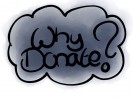First: thank you to everyone who responded to my last post. Whether we are entirely in agreement or not, I appreciate it when you take the time to engage. Particularly when it’s on as fraught and complex a topic as this. I’ve been biding my time before saying anything else on the matter for precisely that reason- this is a big, difficult topic that many people feel extremely raw about.
There are some things I want to tackle, though. We seem to be arguing a lot over the question of whether Charlie Hebdo is racist/Islamophobic or not and whether we agree with what they did. Particularly in the context of #jesuischarlie, those of us who feel uncomfortable identifying with Charlie Hebdo are stuck in between two things that (to vastly different degrees) we aren’t okay with.
There are a few reasons why I’m uncomfortable with #jesuischarlie. One is that I don’t feel comfortable with how Charlie Hebdo and similar publications express themselves and their effects on marginalised groups. Another- far greater- part, though, is that I feel like uncritically standing as (as opposed to with) them contributes to the black-and-white, with-us-or-against-us kind of thinking that gets us into this goddamn mess in the first place.
But I don’t want this to be a post about the virtues or flaws of Charlie Hebdo. Instead, let’s take something as a given: many of us who utterly deplore murdering people for their speech are, nonetheless, uncomfortable with the pressure to identify with that speech in order to condemn these murders. There’s an assumption that you’re either #jesuischarlie, or you’re tacitly supporting people who murder others for their views and blaming cartoonists for being killed.
Whether or not you agree with Charlie Hebdo’s work (or see it as a hell of a lot more complicated than agreeing or disagreeing), this fact remains: there are going to be times when all of us are called to condemn atrocities against people we disagree with. We need another way to do that.
I don’t think it’s as simple as that not-actually-Voltaire quote we keep throwing at each other, although that is definitely an improvement. That quote is just a platitude, though, isn’t it? It’s throwaway.
I think that if we’re going to tackle issues of violence and freedom of expression, we need to figure out ways to stand with-not-as victims. We need to make space for multiple kinds of solidarity, including those that acknowledge our differences instead of papering them over. Because this isn’t simple. There are multiple things going on that will change how we show our support for victims. We need to work out ways to do that that don’t necessitate shutting down discourse.
I’m not certain how to do that. But I don’t think that we’re going to get anywhere if we don’t start working it out.
Even bloggers have to pay the bills! Monthly subscriptions- no matter how small- help give me the security to devote time to this place and keep a roof over my head: 




Thank you for this and the earlier post. They both do a pretty good job of explaining exactly why I was hesitant to jump on the #jesuis bandwagon. It’s been kind of strange seeing such defensive responses from people on FB and all over blogs at the idea that CH’s work contains elements that many see as racist/sexist/homophobic. I mean, even if it doesn’t look that way to them, I would hope that they can see how it might be seen that way by others and that they would just respect that rather than doubling down on the you-don’t-get-satire/context/history charges. Or perpetuating the false premises that 1.) a person can’t simultaneously support free speech while reserving the right to criticize CH’s more troubling material or 2.) criticism of CH = supporting terrorism (or more accurately refusing to fight it.) It’s also been strange to see many people conflating “I’m choosing not to #jesuis because…” with “you can’t/shouldn’t #jesuis…and if you do you are racist” when nobody is actually saying that.
That famous (not)Voltaire quote really needs to be amended to add “but I defend to the death your right to say it, as well as the right of others to criticize it and/or criticize you for saying it.”
To be quite honest, I find this post pretty empty. You made some very serious charges in your previous post, and now you seem to want both to change the subject and to reiterate the original charges without actually defending them. I’ve discussed my problems with this approach, at some length, here.
+1
I did that deliberately because I feel that right now is neither the time nor the place to discuss that. I’d ask that you accept that there is a legitimate diversity of opinion on CH and their work, and actually engage on the question I’ve asked that we talk about.
I too find this post rather disappointing as a response to your previous one, Aoife. As Salty Current pointed out, you made some serious charges, and despite all that has been said, you either stand by them unmoved, or choose not to show you’ve changed your mind by slightly shifting the debate away from the very thing that caused a stir. I am not going to further elaborate on this, since Salty Current’s link does an excellent job of putting my own thoughts across.
From Salty’s blog:
I’ve seen the “they aren’t racist” explanation of their most offensive cover, and it’s the same sort of intent=magic defense Dan Savage uses to defend his transphobia. I’m opposed to the “ironic” racism/sexism/homophobia/transphobia/bodyshaming/slutshaming/etc of people who are ostensibly anti-r/s/h/t/b/s/etc as much as I am opposed to the more full-blooded flavors of those prejudices coming from the kyriarchs. If someone allies themselves to members of oppressed races while making caricatures that could be reblogged by the KKK with zero modification, they are being a shit ally.
I am glad the terrorists are receiving near-universal and very passionate condemnation & from powerful quarters – they are the unequivocal villains, with no excuse or shred of legitimacy anywhere in their twisted world view. But I still can’t be Charlie. I hate that I have to say these things about them after they were made victims of a terrible crime, but we aren’t being given a choice about this – because Je suis Charlie was chosen as the rallying cry.
I have done bad things. If I was chopped to pieces by assholes on Wednesday, I’d say it’s legit for those I’ve wronged to express annoyance at mandatory praise for me on Thursday.
Thank you.
This is precisely what I’m talking about. I’m not arguing what you’re suggesting I am, which should be clear from the actual words in my blog post. I don’t know whether you’re not reading my words, refusing to acknowledge and engage with them, or just shutting down your critical faculties, but this is a bad approach. I hope that if you’re ever subjected to this sort of accusation, people treat you more fairly.
And Aoife, I can’t tell who you’re thanking, but I’m unhappy with the way you’re treating this subject, and that subjectless thank you is as frustrating as the fact that your post thanks people who challenged your claims and manner of arriving at them but then refuses to recognize the content of those challenges. I’m not going to bother trying to continue any discussion, because it doesn’t seem to me that this is a discussion, at least not an intellectually honest one.
Given that I’ve already said several times that that particular discussion is not one that I want to be having right now, I’m absolutely fine with that?
And I’d apologise for not having the conversations that you want me to have here on my blog but.. No. You don’t actually get to tell me what I should be talking about on my own space.
Also: just because I don’t choose to post about something doesn’t imply that I haven’t been listening to what people are saying. It means that I am more concerned with speaking about something else right now.
There are a few reasons why I’m uncomfortable with #jesuischarlie.
I don’t understand the language well and so I can’t make out the level of truth about the accusations against Charlie (The little I have seen indicates to me that the cartoons were misinterpreted by some)
But I do mock religion and I expect the right to be able to do that without fear of violence. So I am Charlie or I could be tomorrow if some violent nutcase comes across my stuff.
The tag doesn’t mean that I support everything they have printed – I’m not sure why you are interpreting it that way.
[…] Aoife O’Riordan’s blog post here and the article that preceded it here, Salty Current had this to say. I responded in the comments […]
Salty – I made a blog post about this, feel free to comment there. I am very strict about moderation, but it shouldn’t be a problem for you. I trust that you have reasonable values, unlike the creeps that usually try to slyme up my joint.
http://atheismplus.com/blogs/gas/2015/01/15/exchange-with-salty-current-re-je-suis/#more-65
I felt that Je Suis Charlie, Je Ne Suis Pas Charlie and Je Suis Ahmed all came from people who were fundamentally supporting free speech without violence, while reflecting their stance on the wider issues. So take your pick or choose another one. How about Je Suis Libre de m’Exprimer? Too awkward?
I also don’t think it’s become ideologically necessary to refrain from criticizing Charlie. The dead cartoonists would have been most surprised at such an idea, they would hardly have known where to put themselves, given the reception they were used to.
Incidentally, I got round to analysing just one of Charlie’s images, the one of Taubira, using the techniques which underpinned my art history/history degree. My conclusion is based on the reality of how people read imagery, I think the size and centrality of the Taubira-as-monkey cartoon made the image ‘about’ a racist depiction of Taubira, over-shadowing the symbol and text which were supposed to make it ‘about’ the racism of the Front National. I felt Charb misfired on that one, and possibly for no better reason than ‘clickbait’. This doesn’t reflect on any of their other images which I didn’t look at yet.
You can read the whole thing if you like and drown me in criticism if you think it’s appropriate.
There you go, people who want to engage le topic – another article, another place in which to do so.